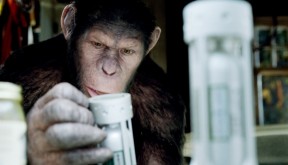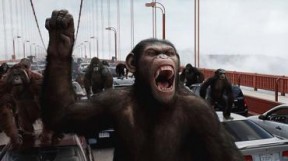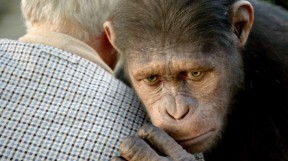At some point in Rise of the Planet of the Apes, between tears and smiles, I wanted to punch the air with my fist and say, “You go Caesar!”
Caesar. We will come to him later but on a day when I heard a supposedly well meaning teacher say, “Only if you take away something that a child loves, will he learn,” watching Rupert Wyatt’s film which has power hungry representatives of the human race taking away the dignity and natural joy of those they call “stupid monkeys,” rang bells in the soul.
The film’s subtext has been read and written in many films especially in Peter Jackson’s powerful and lyrical King Kong (2005) where the human need to tame what cannot be tamed, was indicted and damned. Many films have been made on this eternal conflict between the natural order and the manner in which we invade, plunder, disrupt and destroy what we cannot understand or we hate, are afraid of and want to control.
The film cut even closer to the bone in the context of my city where many are thirsting for the blood of stray dogs without thinking of a more humane solution to their presence. And also because it mirrored a world where no one takes responsibility for the causes but almost everyone reacts to the effects. The effect here is the fall out of a genetic experiment gone wrong and in our world, we can’t and won’t account for the vanishing natural habitats of species other than ours but will react when wild animals, from monkeys to leopards to elephants stray into human habitat. And then ofcourse we will beat them back or cruelly punish them.
This film makes a sobering comment that we will pay a price someday for our cruelty and heedlessness towards creatures to whom we deny what is their due. Dignity and the right to life. Despite the fact (as pointed by a minor character in the film) that they are not dispensable objects but unique personalities with attachments, thoughts and feelings.
Planet of the Apes franchise has been many things but this is possibly the only film that treads the line between science fiction and emotional drama without falling face first in the cold calculativeness of the former and the cloying sweetness of the latter. If anything, it is a film that grabs you, to use a bleached cliche, by the scruff of your neck and takes you bouncing heart first through sequences that move you, break your heart and yes, make you want to punch the air for the massively clumsy and yet staggeringly dignified simians who have more integrity than most humans.
Rupert Wyatt has almost pulled off a miracle. Despite the heavy duty special effects and massive confrontational show stoppers (watch out for the majestic expedition the apes undertake across San Francisco), this is essentially the story of courage and heroism. A story that begins when a protective mother chimp is shot down and you see her furry body sprawled on a table with a pool of blood growing under to underscore the cold bloodedness of our race. The location is a lab where genetic tampering is on and after dozens of helpless chimps are put down as a result of a supposedly botched experiment, one little being is rescued and nurtured by geneticist Will Rodman (James Franco).
The baby is named Caesar by Will’s Alzheimer stricken father (the wonderful John Lithgow) who still loves his Shakespeare whenever memory visits him in luminous snatches. And what a beautiful moment when a little simian finger curls around the human finger on a difficult night and bonds this little dysfunctional family into a whole where three ‘men’ learn to co-exist and care for each other.
It is easy to shed tears for Caesar when he is torn away from trust and love and the comfort of a home much like Rio’s Blue and is taken to a hell hole where hundreds like him are incarcerated and tortured before they are turned over to scientific and genetic labs. From the moment, he draws a window on a stone wall to the point where he takes charge of his destiny, the entire transition makes for spectacular viewing.
There is Freida Pinto somewhere too and those who are presenting her as a counterpoint to Aishwarya Rai in the West will be disappointed to know that she has less lines to speak in the film than the obscure female lead of the awful Yogi bear flick we were subjected to recently. Atleast Ash had leading parts in her Western outings. Yes, Freida does get to kiss Franco and that should be a matter of great national pride for us all. Franco is far less interesting than Caesar who is played by the marvellous Andy Serkis, described lavishly as the “king of performance capture” by David Germaine (Associated Press). He has also played King Kong before with great pathos.
And when our suppressed hero rises magnificently to say “NOOOO” to indignity and an existence too small for him, it is time to say, “You go big boy..we deserve nothing less. And so maybe we will learn. Maybe we won’t but go on teach us to be human again. And show us that this is not just our planet. But yours too.”
Reema Moudgil is the author of Perfect Eight (http://www.flipkart.com/b/books/perfect-eight-reema-moudgil-book-9380032870?affid=unboxedwri )









“Yes, Freida does get to kiss Franco and that should be a matter of great national pride for us all.”
— Hilarious!